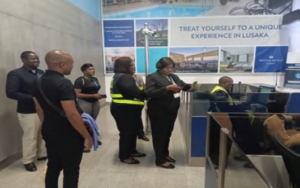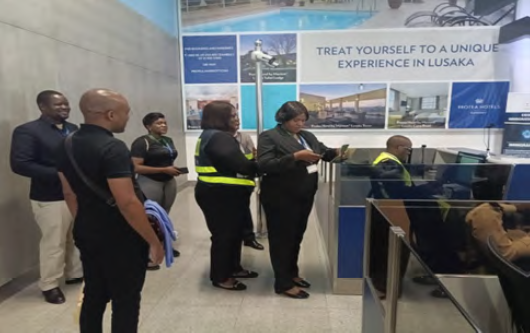
The United Nations Office on Drugs and Crime Regional Office for Southern Africa (UNODC ROSAF) in collabo- ration with the Ministry of Home Affairs and Internal Security, and the INTERPOL Regional Bureau for Southern Africa convened a training on trafficking in persons (TIP), smuggling of migrants (SOM) and border management from 17 to 21 April 2023, in Lusaka, Zambia.
The lack of skills and capacity in the detection, identification, investigation, and referral of trafficking in persons and smuggling of migrants’ cases amongst law enforcement officers, especially front-line officers, remains a significant gap in the trafficking in persons and smuggling of migrants response across the Southern Africa Development Community Region and Zambia is no exception. To close this gap, UNODC ROSAF, under the Southern African Migration Management Project (SAMM) framework, enhanced the capacity of law enforcement officers to address trafficking in persons and smuggling of migrants in Zambia.
The objectives of the training workshop included understanding the international and national legislative provisions on human trafficking and smuggling of migrants; identifying TIP cases; effectively distinguishing TIP and SOM cases; referring victims of trafficking to appropriate institutions for assistance; and improving border management detection and border security.
Speaking during the opening ceremony, Mr Auxensio Daka, Commissioner of Police for Administration, said the training on detecting, investigating and referral of TIP and SOM cases as well as border management skills, came at a crucial time as Zambia was experiencing an escalation in trans-national organized crime, especially trafficking in persons along border towns. “Zambia has been seeing an alarming upsurge of undocumented immigrants entering the country illegally, mostly in transit to other countries across the region, and some of these are smuggled migrants as well as victims of trafficking in persons”.
One of the key outcomes of the training work- shop was a discussion and agreement on the investigation techniques required to solve a suspected trafficking in persons’ case, currently under investigation by one of the law enforcement officers in attendance. Participants also took part in a practical exercise at the Kenneth Kaunda International Airport in Lusaka as part of the border management segment of the training. Twenty-five participants attended — 14 female and 11 male.
At the end of the training, participants could describe and apply the elements of trafficking in persons and smuggling of migrants as set out in international and domestic legal frame- works to local trafficking in persons’ cases. The participants could also distinguish between trafficking in persons cases and smuggling of migrants and learned how to apply victim centered approaches when responding to these cases.
 English
English

